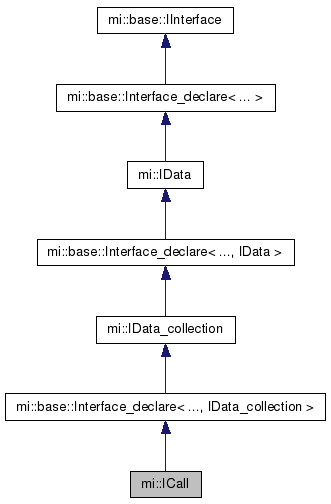This interface represents calls. More...

Public Member Functions | |
| virtual const ICall_decl * | get_call_decl () const =0 |
| Returns the call declaration for this call. More... |
|
| virtual Sint32 | set_function_definition (const char *name)=0 |
| Sets the represented function definition. More... |
|
| virtual const char * | get_function_definition () const =0 |
| Returns the DB name of the represented function definition. More... |
|
Additional Inherited Members | |
 Public Types inherited from mi::base::Interface_declare< 0xae697ff3, 0x3c43, 0x4329, 0xb4, 0x8c, 0x5d, 0xb3, 0xdb, 0x78, 0x29, 0xaa, IData_collection > Public Types inherited from mi::base::Interface_declare< 0xae697ff3, 0x3c43, 0x4329, 0xb4, 0x8c, 0x5d, 0xb3, 0xdb, 0x78, 0x29, 0xaa, IData_collection >
| |
| typedef Interface_declare< id1, id2, id3, id4, id5, id6, id7, id8, id9, id10, id11, IData_collection > |
Self |
| Own type. More... |
|
| typedef Uuid_t< id1, id2, id3, id4, id5, id6, id7, id8, id9, id10, id11 > |
IID |
| Declares the interface ID (IID) of this interface. More... |
|
 Static Public Member Functions inherited from mi::base::Interface_declare< 0xae697ff3, 0x3c43, 0x4329, 0xb4, 0x8c, 0x5d, 0xb3, 0xdb, 0x78, 0x29, 0xaa, IData_collection > Static Public Member Functions inherited from mi::base::Interface_declare< 0xae697ff3, 0x3c43, 0x4329, 0xb4, 0x8c, 0x5d, 0xb3, 0xdb, 0x78, 0x29, 0xaa, IData_collection >
| |
| static bool | compare_iid (const Uuid &iid) |
Compares the interface ID iid against the interface ID of this interface and of its ancestors. More... |
|
This interface represents calls.
Calls appear in the fields and temporaries of the MDL interface mi::neuraylib::IMdl_compiled_material. They represent calls of instances of mi::neuraylib::IMdl_function_definition.
Calls are very similar to structures: the arguments of a call are equivalent to the members of a structure. In addition to structures, calls have one additional data item: the name of the called function definition.
Calls are based on a call declaration which defines the call arguments (their types, name, and the order). The type name of a call is the name that was used to register its call declaration. This type name can be used to create instances of a particular call declaration (note that "Call" itself is not a valid type name as it does not contain any information about a concrete call type).
This interface does not offer any specialized methods, except get_call_decl(), set_function_definition(), and get_function_definition(). Most of the call functionality is available via methods inherited from mi::IData_collection where the name of a call argument equals the key. The key indices correspond with the indices in the call declaration.
'(' which indicates that it has been automatically generated. In this case the type name should be treated as an opaque string since its format might change unexpectedly. It is perfectly fine to pass it to other methods, e.g., mi::neuraylib::IFactory::create(), but you should not attempt to interpret the value in any way. Use get_call_decl() to obtain information about the type itself.
|
pure virtual |
Returns the call declaration for this call.
|
pure virtual |
Returns the DB name of the represented function definition.
|
pure virtual |
Sets the represented function definition.
Note that a NULL pointer is a valid parameter value that clears the previously set function. Subsequent get_function_definition() calls will return NULL then.
| name | The DB name of the represented function definition. |